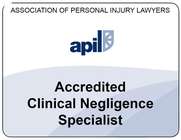medical negligence
Woman suffers severe injuries and PTSD after denied caesarean request

Most women who give birth vaginally do so safely and without any long-term health issues. However, according to NHS data, around 4% of women suffer third- or fourth-degree tears during childbirth. In some cases, complications can result in severe and life-changing maternal injuries.
Sadly, Tees Law’s specialist Medical Negligence team knows only too well the devastating impact of such cases. One example is Niamh who experienced a third-degree tear following a vaginal birth. This was despite Niamh having expressed a preference for planned caesarean section. Her claim against Kingston Hospital NHS Foundation Trust is based on breaches of duty before, during and after delivery.
Lack of informed consent
Niamh became pregnant in early 2018.
At 16 weeks, she met with a male registrar and explained that she expected she would need to have a C-section because all the women in her family had given birth that way. In addition to her family history, Niamh’s very slight build further suggested that C-section would be the best method to deliver her baby. Niamh recalls: “the registrar looked me in the eye and said that ‘we would very much support a vaginal birth at this stage’. lt felt to me from the outset like it was going to be a battle to get a c-section and that I was being told that I didn’t need one, despite my family history. To be told so early on that I would need to have a vaginal delivery, made me really anxious.”
Later on at her booking appointment, Niamh also explained her family history of c-sections to the midwife. The midwife referred Niamh to Birth Options to discuss the mode of delivery. There, she was told that a vaginal birth would be much better for the baby. She was also informed that a vaginal birth would allow her to get back to her daily routine sooner. Additionally, she was warned of the risks of having a C-section, including the potential to lose a lot of blood.
Throughout the antenatal process, Niamh repeatedly asked about having a C-section. At 26 weeks, it was noted that she felt “very anxious about [the] birth and uncomfortable within the hospital”. She expressed doubts about her ability to give birth vaginally but was nevertheless encouraged to pursue this route. In the end, based on the medical assurances she had received, Niamh agreed to proceed with a vaginal birth.
An assisted delivery
A week before Niamh went into labour, an ultrasound scan revealed that her baby was back-to-back, a position that increases the risk of complications during delivery. At this point, Niamh asked again if this meant she should have a C-section. She was told that the baby would likely turn around and there would be no problem.
In October 2018, Niamh went into labour spontaneously at 40 weeks. The baby remained back-to-back, and Niamh could not deliver so she was taken to theatre for assisted delivery. A C-section was not offered to Niamh. Instead, the baby was delivered after three pulls of the ventouse and four pulls of the forceps. Her daughter, Darcey, was born safely, but the instrumental delivery caused Niamh to sustain a Grade 3 tear, along with significant and irreparable muscle damage.
Postnatal negligence
Niamh bled heavily for 16 days after giving birth. She suffered faecal urge symptoms and abdominal distension, and her haemoglobin levels fell to 52 grams per litre. On day 5, she was given an X-ray but was refused a CT or MRI scan. The X-ray didn’t reveal anything and despite her symptoms, Niamh was told there was nothing untoward. Niamh pressed for a CT or MRI scan but continued to be refused. Finally on day 9, after having to wait a full weekend and only after continuing to press further, an ultrasound was performed, which failed to detect any medical issue.
Finally, a CT scan was arranged and Niamh was subsequently diagnosed with a pelvic haematoma requiring surgery.
After this, she was unable to pass urine. Several attempts at trial without catheter failed, but instead of being referred to uro-gynaecology, she was discharged with a catheter.
Niamh was in and out of hospital several times during November 2018 to attempt a trial without catheter (TWOC). Eventually, Niamh sought her own private consultant and on the consultant’s medical advice, went back to the NHS to request a suprapubic catheter.
Niamh was re-admitted in late November 2018 and underwent further surgery to insert the suprapubic catheter into her stomach, a procedure which she found extremely distressing.
Niamh’s catheter was not removed until the start of January 2019. During this time, she experienced coccyx, groin and deep pelvic pain, as well as faecal urgency. Since then, Niamh has continued to suffer from psychiatric injury. She has been diagnosed with PTSD and also suffers chronic coccyx pain, which causes her to wake up in pain. She also suffers urgency of continence and has not been able to return to work.
Failures at every stage
There were medical failures at every stage in Niamh’s story. In antenatal meetings, she was not properly counselled as to the pros and cons of C-section compared to vaginal delivery. Having expressed concern regarding the risks of giving birth vaginally, specifically in relation to her family history of C-sections, Niamh was assured that this was the best method of delivery. At no point was she presented with a balanced picture of the benefits and risks of each option. If she had been warned of the risks associated with vaginal delivery, she would have chosen a C-section.
Although she knew there was a small risk she could tear, Niamh was not warned this could lead to difficulties with continence. Moreover, she was warned of the dangers of C-section and the potential disruption this could cause to her recovery, but she was not provided with an equivalent risk assessment of vaginal delivery. For example, she was informed that she could suffer excessive bleeding with a C-section but was never told that this could also happen with a vaginal delivery. Niamh was also not informed about the risk of requiring instrumental assistance.
During labour, there was an opportunity to perform a C-section yet Niamh was not offered the option of a C-section. Furthermore, once assisted delivery with ventouse and forceps had been chosen, there was a failure to manage the delivery in such a way as to avoid the tear.
Finally, Niamh experienced negligent postnatal treatment. There was a delay in escalation, imaging, identification and treatment of the haematoma. Had the haematoma been diagnosed and treated earlier, the extent of the infection would have been less severe. Because of the failure to treat in a timely manner, her episiotomy wound broke down twice and wasn’t able to heal properly which has resulted in the formation of extremely painful scar tissue.
An all-too-common problem
Ultimately, had Niamh been able to go ahead with her preference for a planned C-section, she would have avoided the third-degree tear, haematoma and the rest of the consequences that have resulted from her instrumental delivery. Unfortunately, Niamh is not alone in suffering injury and long-term complications from a vaginal birth that should have been avoided.
Official NICE guidelines state: “For women requesting a caesarean section, if after discussion and offer of support… a vaginal birth is still not an acceptable option [Trusts should] offer a planned caesarean section.” Yet a report by Birthrights in 2018 revealed that only 26% of Trusts offered C-sections in line with NICE best-practice guidance.
Here to help
Our Medical Negligence solicitors are devoted to achieving the justice our clients deserve. If you have been affected by medical negligence, we can support you on your journey to justice, looking out for your needs and priorities every step of the way.
Call for a FREE initial consultation on 0800 013 1165
Alternatively, you can fill out our enquiry form and we will let you know how we can help. We can also visit you at your home if you wish.
Our medical negligence lawyers are based in:
- Cambridgeshire: Cambridge
- Essex: Brentwood, Chelmsford and Saffron Walden
- Hertfordshire: Bishop's Stortford & Royston
But we can help you wherever you are in England and Wales.
Chat to the Author, Janine Collier
Executive Partner, Medical Negligence, Cambridge office
Meet Janine
- Areas of expertise
- Accreditations
- Testimonials
Legal 500 UK 2025
East Anglia
Janine Collier - one of the outstanding practitioners in the country. Not only excellent on all her own cases but ensures the standards of the whole team are extremely high.
Legal 500 UK 2025
East Anglia
Janine Collier is an excellent solicitor and runs a very dedicated and efficient team.
Legal 500 UK 2025
East Anglia
Janine Collier is exceptional for her detailed factual and legal analysis of claims, the high standard of her instructions, and her sensitive client management. Her energy is remarkable.
Legal 500 UK 2025
East Anglia
Janine Collier is an extremely able and committed lawyer; apart from her skill as a litigator and negotiator, Janine is known for going the extra mile for her clients. Janine's tenacity is evident from the excellent case outcomes she achieves; even in the most complex of cases, she is unafraid to litigate if the right settlement cannot be achieved, but her negotiating skills are such that she sees the benefits of settlement where the award is at an appropriate level as this provides certainty that does not follow litigation.
Legal 500 UK 2025
East Anglia
'Janine Collier inspired confidence and put us at ease. Janine always showed great empathy, and we felt we weren't treated simply as a case but as individuals. She was in regular contact by phone/email - even out of hours when required. She built a great team of experts for our case - and regularly questioned and challenged them. She also found us a good case manager, who found us experts who could really help us - and she negotiated an advance on our settlement to fund these.
Anonymous
Cambridge
Janine was extremely compassionate and caring about my experiences. Her words have remained dear to my heart and kept me strong throughout this process. She is a remarkable lady who truly wanted the best outcome for me. Anytime I contacted her, she always explained everything thoroughly and in detail. My queries were always resolved in her presence. She has a very good heart.
Legal 500 UK 2024
East Anglia
Janine Collier is a stand-out. She would be coveted by all top firms. An excellent leader, an excellent litigator.
Legal 500 UK 2024
East Anglia
Janine Collier has been brilliant throughout our whole process, and I have felt extremely supported and able to trust that she has my son’s best interests in mind with everything she does.
Legal 500 UK 2024
East Anglia
Janine Collier is hugely able and extremely hard-working – a perfect leader of the team as well as a fantastic litigator.
Legal 500 UK 2023
'Janine Collier has an amazing reputation and quite rightly, she very quickly spotted something that wasn’t the main focus of the case but is able to zoom out and look at everything that’s going on and spot things others wouldn’t spot. You can tell she really cares and is a very dedicated person who just wants to help. The team are all caring and efficient'
A
Cambridge
'A heartfelt thank you for all you have done in preparation for and during the settlement meeting, as well as for your unfailing support along the way, in and out of hours. It is undoubtedly due to your high professionalism if the outcome today has exceeded all expectations; it will be a huge help for us going forward and we will be forever grateful'
Chambers & Partners 2022
Cambridge
'Janine Collier is renowned for her handling of delay in diagnosis, obstetric injury and surgical negligence claims. She is at the top of her game and knows clinical negligence inside and out'
Susan Hickman
Cambridge
'We consider ourselves fortunate to have been recommended to Tees by the solicitor we initially approached. We did not realise it until the case was well established that the level of professional care we were receiving was exceptional and that the experience of the individuals and the contacts they have to assist in a very complex case was the best available. We are grateful that we received a satisfactory settlement as a result of their efforts under difficult circumstances and dealing with defendants that were obstructive and disorganised. By far the greatest benefit for us however is the fact that the victim, with assistance from highly skilled experts that we would not have known about otherwise, learned to walk short distances when all other medical opinion did not consider this possible. This was their greatest achievement which is well beyond the service we expected'
The Fisher family
Janine works with empathy, understanding and compassion. She handled our mother's inquest with skill and sensitivity and guided us expertly. She kept us informed continually via email and multiple meetings and phone calls. Janine completely took the sting and the stress out of our case.







